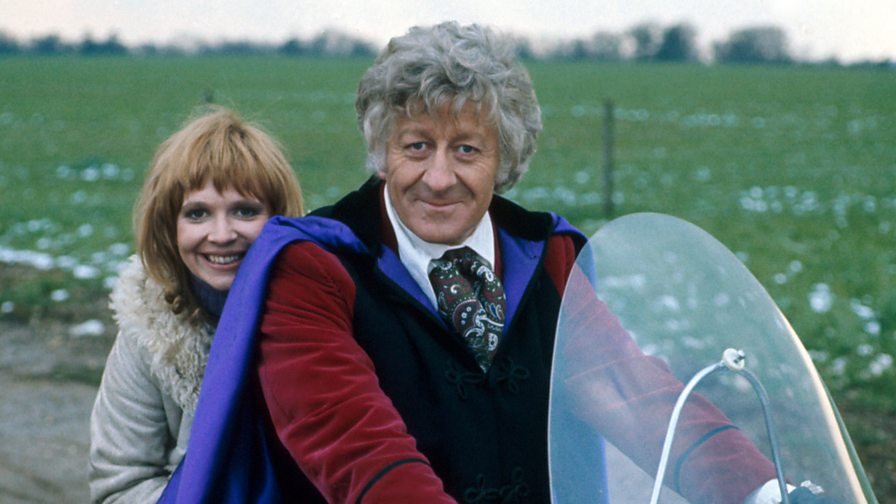When I think about all the Doctor Who stories that I’ve loved since I first saw them, and there are a few, in amongst my Earthshocks, Spearhead from Spaces, and The Stolen Earths is a quaint little story called The Dæmons.
Now I’m not going to sit here and make you read that The Dæmons isn’t a very popular story; indeed the opposite is true — to my knowledge, it’s the only story where fans still, almost religiously, flock to the location site, and a convention is held, A Day in Devil’s End, every year. But when you look at other stories from the same era, I find sometimes that The Dæmons doesn’t really get much of a look in.
This is fine by me though as it makes The Dæmons feel more like a hidden gem than, say, the sometimes overhyped stories. I wasn’t born anywhere around the time this story aired. I was born a little after the Paul McGann TV Movie, and my first encounter with The Dæmons was watching the black-and-white version of the final episode on The Pertwee Years VHS that I frequently borrowed from my local library.
My next encounter with Devil’s End was when I happened to catch the story, or a condensed version of it, sometime in 2007 on, I think, BBC4. I was caught up by how pacey it was, how much fun the cast seemed to be having, and how tightly written it was by the mysterious Guy Leopold.
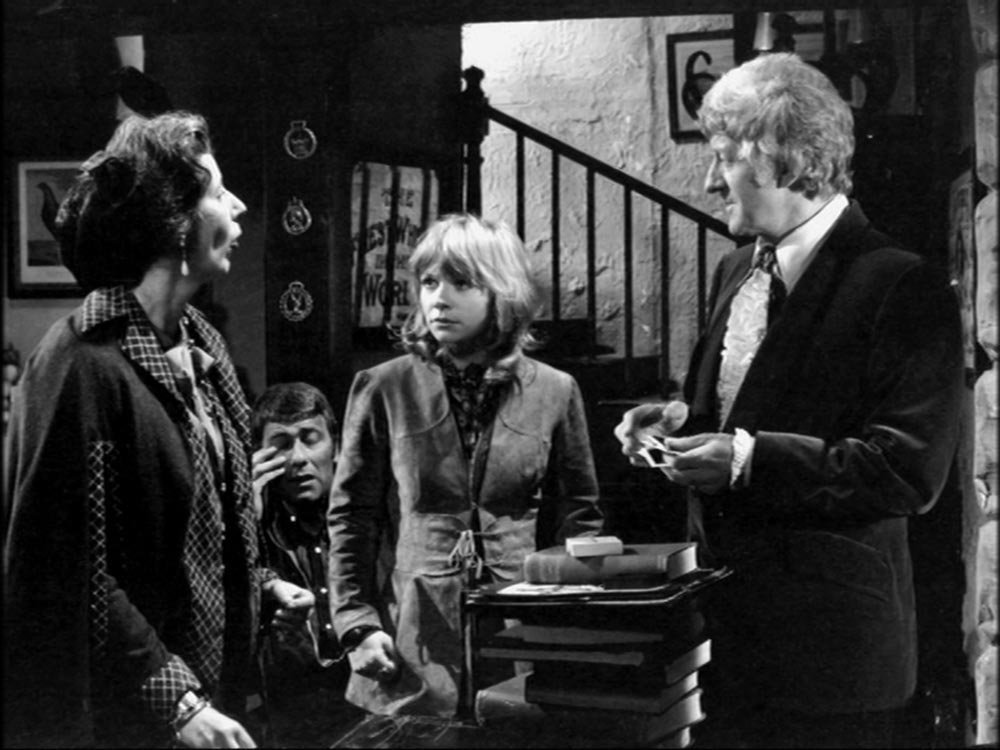
It would be years before I learnt that Guy Leopold wasn’t a real name but a clever way to hide that Barry Letts had actually written it. My first proper viewing of the story was when it was finally released on DVD with re-colourised episodes, and I can remember my Dad giving me the money to buy a copy of the DVD from WHSmith. At £9.99, it was a bit of a steal!
My Dad plays a big part in my love for this story, but I’ll get to that a little bit later on. I can remember watching all five episodes in one go with him when we got home and thoroughly enjoying it. Dad always loved the Jon Pertwee era; he was mad about old cars and would sit there and tell me what each car UNIT was driving. He was greatly upset by the exploding Bedford when it hits the heat barrier!
He was also pretty startled by Bok popping up over the barrow to attack the Doctor and Jo, despite him being wholly unconvincing.
The other day, I took part in a watchalong on Twitter for the story, and my mother happened to be in the room as I was watching it — her opinions on what she was seeing were a whole lot more unforgivable than my father’s! But Bok is one of those things about this story that makes it very charming. When he is sat down and his eyes are lighting up, he looks genuinely creepy; when he’s stumbling around like he’s trying to get home after a heavy night of drinking and keep a cigarette in his mouth, then he’s less so. But as with much of Doctor Who, including some of the stuff from the 2005 series onwards, the silliness of it makes it a charming sell to people, and maybe a little unsettling.
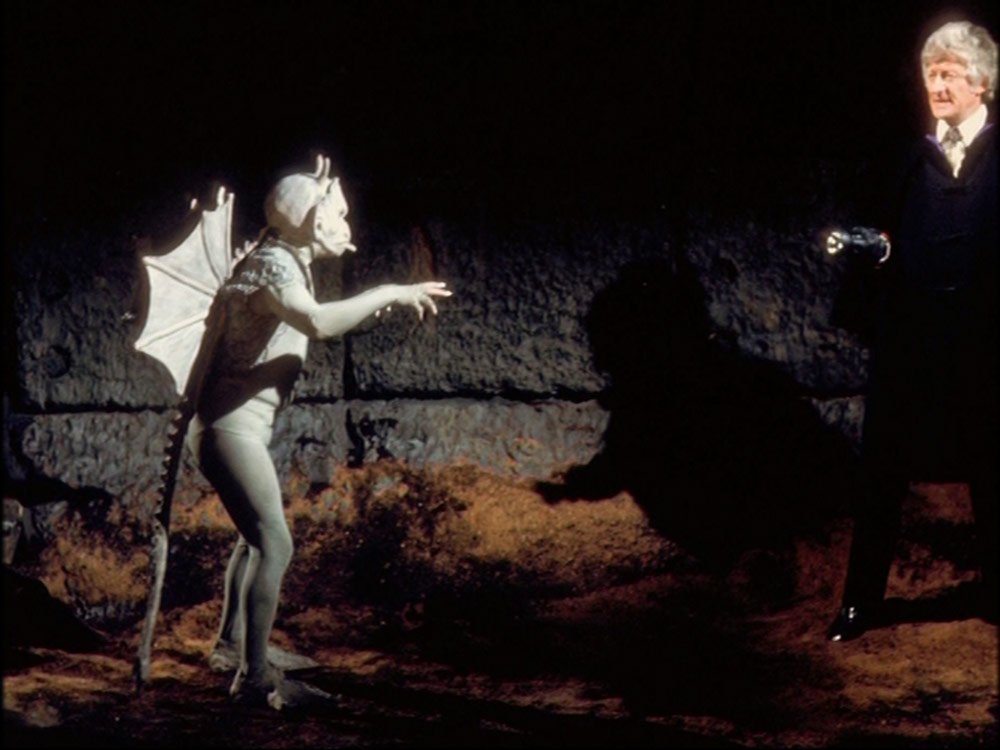
What is unsettling about this story is the brilliant look at village life. I come from an island that feels a lot like Devil’s End. It has the feel of somewhere that is so out of the way, it has its own rules, and there is no doubt that when belief in witchcraft was rife, Devil’s End or indeed my own hometown of Hayling Island would’ve enjoyed more than its fair share of burning people alive. Indeed, there is even the notion that the Doctor might meet the same fate as those poor innocents from history.
This look at witchcraft still feels as fresh now as it did in the 1970s. With the Wicca movement nowadays, The Dæmons takes a lot of inspiration from things a little closer to home. Olive Hawthorne mentions the last witchcraft act being removed in the 1950s. She is referring to Helen Duncan, the last person in the UK to be tried and imprisoned as a witch.
The history of witchcraft is something that fascinates me; though I don’t believe in it at all, it is a fascinating topic. It’s often a darker look at belief and religion and the production team at the time had to keep much of the witchcraft elements in the story to the bare minimum. Still, there is mention of occult holidays like Beltane as well as the Master chanting spells and incantations, though viewers at the time were probably pleased to know that these were actually nursery rhymes told backwards and the name of fellow actress Damaris Hayman said backwards too.
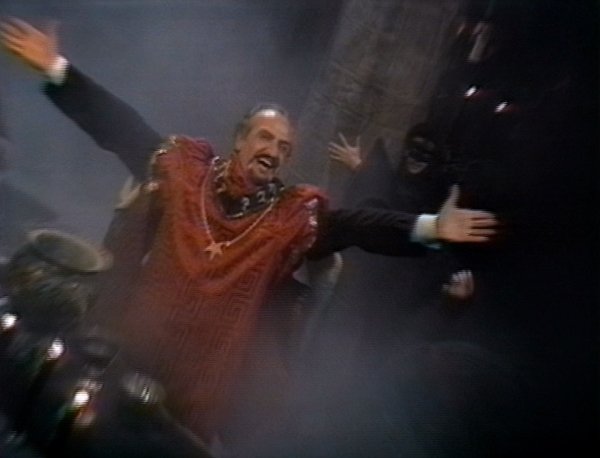
Again, all of this adds to the charm of the story: trying but not trying to scare the living daylights out of people viewing had long been an aspect of Doctor Who and folk horror was just coming into fashion. Though it would be a few years before The Wicker Man came along, which had this story been made after would have probably had some influence on it, we’ve got films like Blood on Satan’s Claw, which tackles a similar subject of a village falling prey to the devil coming into the world.
I would be very surprised if Blood on Satan’s Claw weren’t at least an influence on the story, if not where Letts, or – sorry – Leopold, got his idea for this story from. There, we have witchcraft, locals losing their sanity to mass hysteria, dodgy vicars, cults, and the devil making his presence known in an old church. Luckily though, things don’t get as dark as that here, but the two could be watched one after the other to see the comparisons.
The Dæmons is also a brilliant archetypal look at UNIT stories, with the UNIT family in full swing, being called out to investigate strange goings on. As with all all the stories in Season 8, it featured the Master as the returning baddie, though it would be his last appearance until Season 9’s The Sea Devils. How on Earth anyone could believe someone who is clearly as evil as the Master to be a vicar without his hypnotic powers is beyond me, however! But the Master’s vicar look should have really stayed; Roger Delgado looked so menacing in it, but with the BBC bosses already trying to tone down the religious undertones, maybe a bad-vicar was one step too far.
It’s also one of only a few stories where I would say that UNIT truly felt like a ‘family’. You’ve got the Brigadier whos the father keeping them together, and Benton and Yates are the naughty children, nabbing his helicopter to rescue the Doctor and Jo. The Brig’s realisation they have taken his copter is hilarious, although it’s a shame we didn’t get introduced to his wife here. Even though nothing ever came of it on the show, the fact that Yates and Jo fancy each other didn’t escape the attention of my mother the other day, who — don’t let her tell you any differently, was enjoying this story — asked if they were going out on the show.
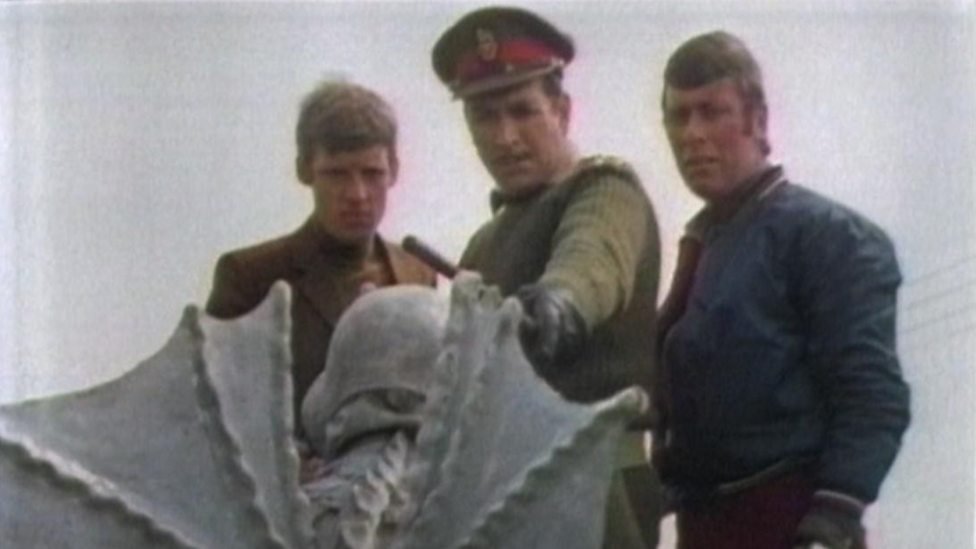
Both Benton and Yates get to be heavily involved in the action and it must have been nice for the actors to not have to wear their UNIT uniforms, instead getting to throw themselves around in their civilian dress. Benton in particular gets a great double act going with Miss Hawthorne. The fact that that pair never got a spin-off is shocking. Come on, Big Finish — give us what we want! Miss Hawthorne is one of those characters we get sometimes who would have made a great companion and makes for an amazing one-off character. The execs at the BBC probably wouldn’t have allowed her to be a witch-witch; instead she was a practising White Witch, which works perfectly for the story, struggling to make the villagers of a town where they make her feel like an outsider see that there is something untoward going on. Feeling like an outsider is something I can relate to, making her another reason why I love this story so much.
And as for the Doctor and Jo, they continue to prove to be a great Doctor/companion duo. There was none of this companion falling in love nonsense that goes on nowadays, but there is no doubt that Jo has a love for the Doctor and his morals and this is what saves the day in the end. Through all the darkness, cults, and black magic going on, it’s love that wins through. While it might be a cheesy ending, and certainly something that gets overused nowadays on television, Jo’s insistence on self-sacrifice to save those she cares for proves the Dæmons’ downfall. So maybe this time, love winning out is a satisfactory conclusion.
It’s a bit of a shame that Azal doesn’t really get much to do but stand around and shout and rant. Despite an imposing and no doubt frightening appearance for viewers in the 1970s, he does look like something from the 1500s book, Daemonologie. It’s a shame we never got to see him traipsing across Devil’s End when Benton and Yates spot his hoof prints but I love how his appearance is explained away as the origins for the devil in our religions. But given how the BBC received complaints for blowing up the church, though it was model shot, maybe a full on devil walking across fields in England would be a little too close to the knuckle. He does at least still manage to be more convincing than whatever was going on towards the end of The Blood on Satan’s Claw.
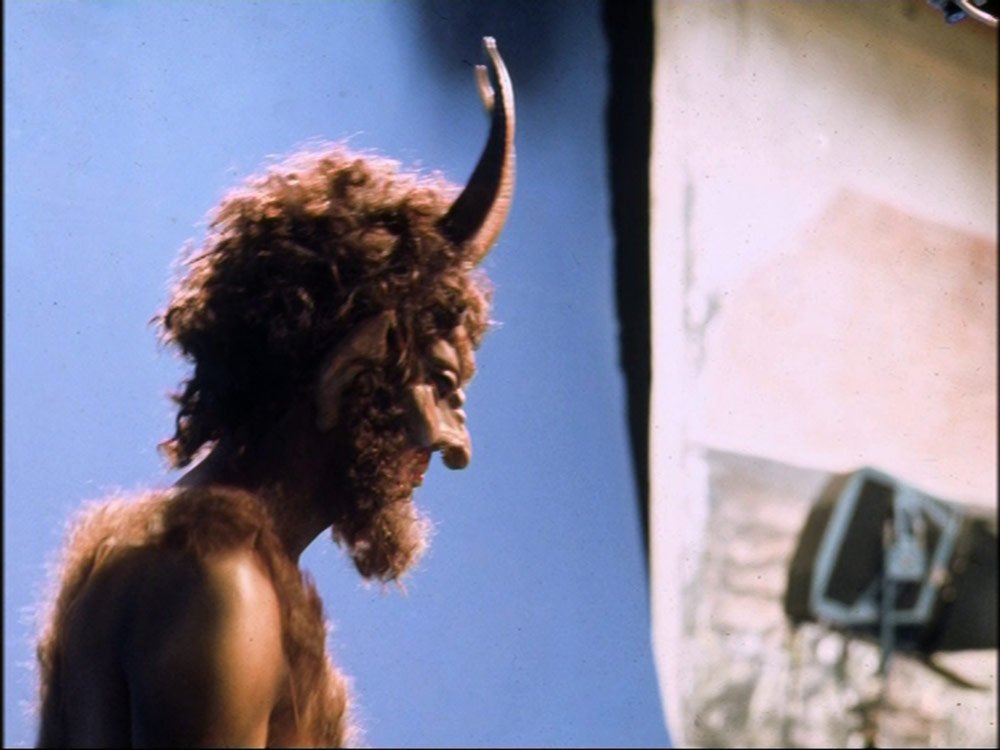
This supernatural aspect of storytelling is something that hasn’t been done too often in Doctor Who and that is another reason why The Dæmons still feels so fresh. It’s only really the Tenth Doctor story, The Impossible Planet/The Satan Pit, that really looks at religion in the modern story and that, much like this, is very cleverly written, not going out to offend anyone but taking a darker look at our beliefs. Maybe the demon at Krop-Tor was actually a Dæmon? Given the size Azal grows to when he makes his final appearance, it could be possible that that devil might have been one of his race too?
From its in-the-middle-of-nowhere location, to the look at the history of witchcraft and religion to the fantastic performances from everyone involved, there is a lot here that makes me love The Dæmons but the one reason why I really love this serial, and why it’s always going to be the ultimate Doctor Who story for me, is a personal story.
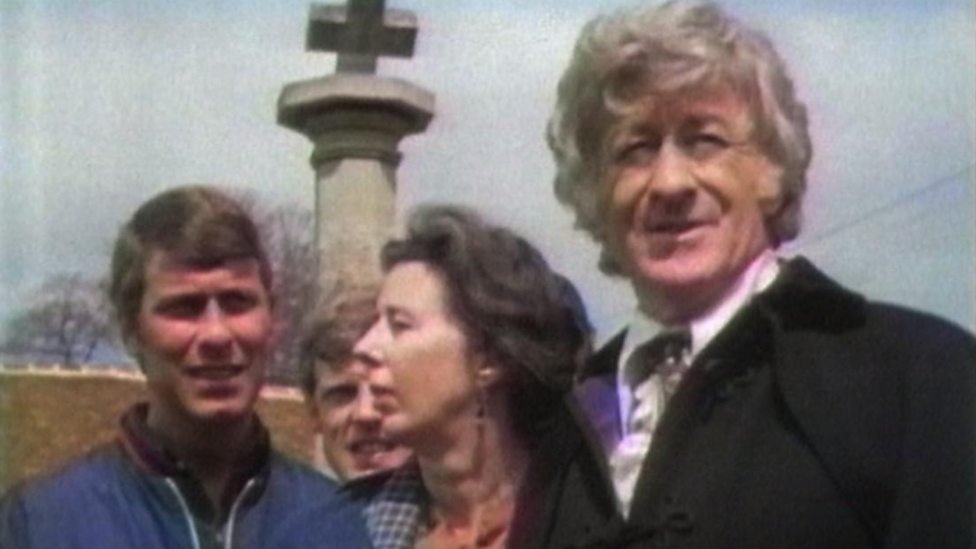
I’ve mentioned how my Dad had watched this story and loved it. We used to watch a lot of Doctor Who together, as well as shows like Hammer House of Horror and The New Avengers. All that changed in 2014 when he was diagnosed with a brain tumour that proved to be inoperable. I saw him vanish quickly and I can still remember where we were when I knew he had no idea who I was. From that moment on, it was like living with a stranger.
We still watched Doctor Who, from my DVD collection or whatever was being broadcast on the Horror Channel at the time. But he kept thinking he was watching an American show called The Invaders. Stories like Robots of Death and The Green Death didn’t seem to register with him at all, despite being firm favourites of his. Then there came a day at the beginning of August when he had a final fall and we believe a small stroke, which put him into a hospice which was where he passed away. But on that morning, we were watching, you guessed it, The Dæmons.
I don’t know what it was that was going through his mind, but from the moments the opening titles kicked in, he seemed to remember everything. He knew the theme tune, the name of the show we were watching. He remembered Jon Pertwee and Katy Manning. He could name all the cars that UNIT drove, even gave a shocked tut at the exploding Bedford!
Through all that, he even remembered me! He knew my name and was looking at me as if nothing had even been wrong. Living with someone with something as horrific as a brain tumour, which in its way is like having an alien sitting in your head, is a trauma in itself. I’ve always been one of those people who just gets up and gets on with things — it’s my way of coping — but I’d be lying if I said I didn’t take comfort from this final happy memory with my late father, from a time when everything was so dark and bleak.
And that is the magic of Doctor Who for me. For others, it’s a silly or stupid little show that I watch and probably should have outgrown years and years ago. But for me, it’s a show that has given so many happy memories to wrap myself in when things get really, really dark. It’s a show that makes me feel safe and warm, that there is nothing that’s going on in the world or my life that Doctor Who doesn’t know how to fix. And for me, The Dæmons, above all other stories, is the one that’s the most special to me.
So maybe, as cringing as it might be now, Jo’s act of love and self-sacrifice that confuses Azal, and the happiness and love my father felt watching this show with me, is what truly ended the darkness.
Maybe, just this once, love truly did conquer all.
